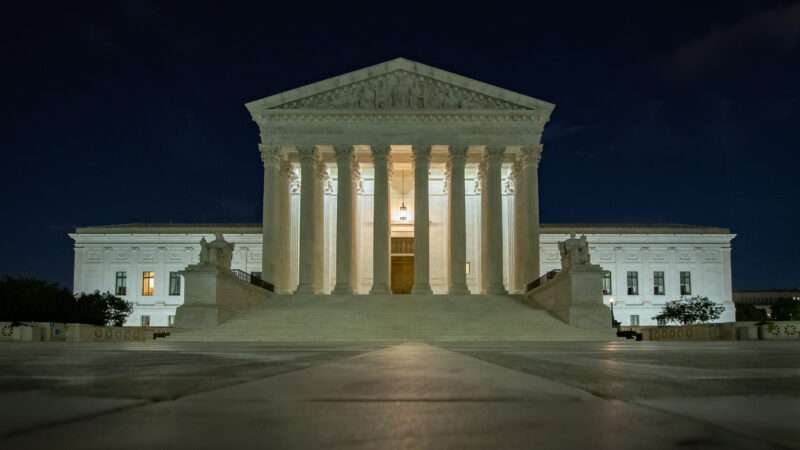
One of the most frustrating aspects of our highly partisan, culture-war-infused times is that people have lost the ability to direct criticism at anyone on their own side of the political divide. This tendency is corrosive because, without self-policing within the warring political camps, almost any form of bad behavior is defensible to one camp if any of its prominent members are caught doing it.
The late Sen. Daniel Patrick Moynihan (D–N.Y.) famously coined the phrase "defining deviancy down" to explain how destructive social behaviors become socially acceptable. But it applies to the political arena, as well. As one definition notes, Moynihan's term describes "the tendency of societies to respond to destructive behaviors by lowering standards for what is permissible."
Essentially, partisans double down to protect "their" favored official, which is why Republicans—who during the Clinton administration argued that character is of the utmost importance in a political leader—have defended a former president who embodies every bad personal character trait that one can cram into a large orange-tinged body. Recalling Moynihan, Trump's behavior is becoming the new normal.
The current fracas over ethics concerns on the U.S. Supreme Court is a predictable outgrowth of this institution-destroying phenomenon. Before I delve into details, ask yourself this question whenever an ethics scandal swirls around a politician or judge you admire: What would you say if the exact same situation involved someone you despised?
Most of us have seen the news stories that center on Supreme Court Justice Clarence Thomas' ethical allegations, but also encompass potential lapses by Justices Samuel Alito, Neil Gorsuch, and Sonia Sotomayor. The first three are Republican appointees and the last one was appointed by a Democrat, which has turned the debate into a "what-about-ism" routine.
The latest news story from The Guardian is hazy, but involves Venmo payments that lawyers with business before the high court allegedly made to a top Thomas aide, apparently related to the justice's Christmas party. We need more information—how much were they, what exactly were they for—before drawing a conclusion. But other Thomas-related news reports seem less murky.
Per news reports, GOP donor Harlan Crow paid thousands of dollars in undisclosed private-school tuition to Thomas' grandnephew when Thomas was his legal guardian. Thomas also failed to disclose that Crow purchased his mother's house in Georgia (where she reportedly lived rent-free), and then made extensive renovations to the property.
Thomas also reportedly received luxury trips and a Super Bowl ring through his membership in the Horatio Alger Association. ProPublica reported that Thomas "has vacationed on Crow's superyacht around the globe. He flies on Crow's Bombardier Global 5000 jet. He has gone with Crow to the Bohemian Grove, the exclusive California all-male retreat, and to Crow's sprawling ranch in East Texas."
Thomas' wife Ginny, a conservative activist who had lobbied Arizona lawmakers to overturn that state's presidential election results, "was secretly paid tens of thousands of dollars in 2012 by a political-advocacy group that not long after submitted a brief in a case that was before the court," the New Yorker explained. Thomas did not recuse himself from election-related cases.
Other Supreme Court scandals seem less extensive, but still troubling. Another Republican donor (who subsequently had business before the court) took Justice Samuel Alito (appointed by George W. Bush) on his private jet to go fishing in Alaska. Justice Neil Gorsuch did not disclose the purchaser of a Colorado property he sold—the head of a law firm that, as Politico reported, had "a robust practice before the high court."
Sotomayor didn't recuse herself from cases involving a publisher that has paid her $3.7 million since 2010. The Associated Press recently found that she used her taxpayer-funded court staff to do outreach for these outside projects, and "often prodded public institutions that have hosted the justice to buy her memoir or children's books."
Instead of using the latter incident as more evidence that the Supreme Court needs higher ethical standards and tougher ethics rules, many Republicans have used it as a "you see, they do it too" excuse to defend Thomas and other Republican appointees. They also point to the left-leaning bias of some publications that have uncovered the alleged conflicts of interest.
Yes, those publications have liberal biases. And, yes, some progressives are using the Thomas/Alito/Gorsuch reports to undermine the conservative majority's legitimacy and push dangerous court expansion plans. But all of these nondisclosures, luxury trips, and gift-taking still seem sleazy. By the way, I'm someone who has been heartened by most of the court's recent decisions and has long admired Thomas' and Gorsuch's jurisprudence.
Instead of "defining down" the standards of the high court based on our partisan instincts, why don't we just say the obvious: For the court to retain its legitimacy, its justices need to avoid even the appearance of a conflict of interest. Was that so hard?
This column was first published in The Orange County Register.
The post Partisanship Is Muddling the Important Debate Over Supreme Court Ethics appeared first on Reason.com.







